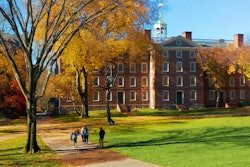As a college professor, Dr. Belle Wei concluded that, too often, engineers were trained only in technical skills without developing personal character. Teaching at San Jose State University since 1987, she observed this in her electrical engineering department and in counterparts such as computer and mechanical engineering. “This wasn’t new. My peers and I were educated the same way in the 1970s.”
So as SJSU’s Don Beall Dean of Engineering, Wei tries educating students broadly. She wants them globally informed and socially responsible. Wei encourages the more than 4,900 engineering students seeking bachelor’s and master’s degrees to take courses in the humanities and social sciences. The engineering college offers undergraduates a minor in business, which helps them better comprehend how their work for an employer is linked to company profits. Wei asks guest speakers—industry leaders from the surrounding Silicon Valley as well as non-engineering faculty at SJSU—to discuss ethics and personal values with students. “Technology can benefit people or kill people. I want students to understand the purpose of all this technology is for benefit. And I want them to lead meaningful lives.”
A signature program of Wei’s is the Global Technology Initiative, a two-week, all-expenses-paid study tour to Asia every year that immerses about two dozen students in the workplace and culture of engineers in India, China and Taiwan. Since 2004, more than 140 students have gained international perspectives by participating in the popular program, which is financed by industry donors. After the trip, they deliver presentations to other SJSU engineering students based on what they learned about their overseas collaborators and competitors. And before students ever set foot on Asian soil, they complete a for-credit, semester-long course in the politics, customs and history of the regions they will visit in order to better grasp the context of their experiences.
“The trip is not a vacation,” Wei says.
While broadening her students’ horizons, Wei has diversified the enrollment. Despite the scarcity of Latino and Black engineering majors nationally, she has increased the representation of Latinos from 11 percent in 2003 to 15 percent by 2008 and that of Blacks from 3 to 4 percent during that period, making the presence of both racial groups on par with that of the rest of the university. Wei credits this to increased SJSU outreach and recruiting at local high schools as well as activism by the college chapters of the Society of Latino Engineers and Scientists and the Black Alliance of Scientists and Engineers. She also established the Silicon Valley Engineering Scholarship, which provides up to $5,000 a year in merit-based awards, renewable annually, to selected undergraduates. This year, 29 percent of the 59 recipients are either Black or Latino.
The changes at SJSU, the largest provider of engineers to Silicon Valley, have been noticed by outsiders, their checkbooks in hand. Under Wei’s tenure, which began in 2003, grants to the engineering college have doubled to nearly $5 million annually and its endowment has blossomed from $7 million to $35 million.
Last year, she was re-appointed to a second, six-year term as dean. Dr. Gerry Selter, SJSU provost, says Wei’s “persistence, perseverance and leadership have earned the college of engineering an outstanding reputation and international recognition.”
Wei, who holds a doctorate in electrical engineering from the University of California, Berkeley, worked for two years for a California aerospace firm before joining SJSU. Her expertise is in very large-scale integration and sensor networks.


















